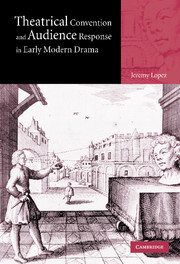Introduction
Published online by Cambridge University Press: 22 September 2009
Summary
Fowler you know was appointed for the conquering parts, and it being given out that he was to play the Part of a great Captain and mighty Warriour, drew much Company; the Play began, and ended with his Valour; but at the end of the Fourth Act he laid so heavily about him, that some Mutes who stood for Souldiers, fell down as they were dead e're he had toucht their trembling Targets; so he brandisht his Sword & made his Exit ne're minding to bring off his dead men; which they perceiving, crauld into the Tyreing house, at which, Fowler grew angry, and told 'em, Dogs you should have laine there till you had been fetcht off; and so they crauled out again, which gave the People such an occasion of Laughter, they cry'd that again that again, that again.
It is commonplace to extol the virtues of the relatively bare stage and non-naturalistic mode of the early modern theatre. Robert Weimann sees in the popular stage a “flexible platform dramaturgy” which was able to subsume a variety of theatrical modes in order to create “an astonishing variety and richness of language.” Andrew Gurr notes that the “conventions of continuous staging and unlocalized settings” in both public and private theatres allowed for an easy “interplay between illusion and reality.”
- Type
- Chapter
- Information
- Publisher: Cambridge University PressPrint publication year: 2002
- 3
- Cited by



